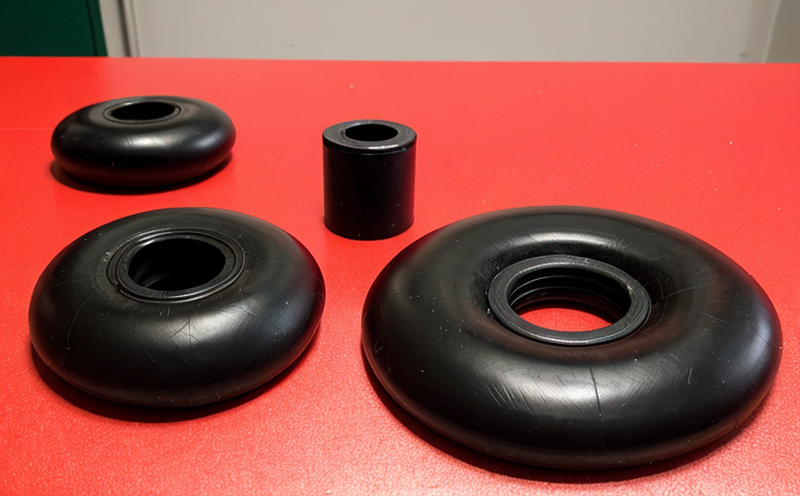UNE EN ISO 6502 Rheological Testing of Rubber Compounds
The UNE EN ISO 6502 standard specifies a method for determining the rheological properties of rubber compounds. This test is essential in quality management, compliance, and research and development (R&D) within the polymer and plastics sector. Understanding the viscoelastic behavior of elastomers under various conditions ensures that products meet performance expectations across diverse applications.
Rheology plays a pivotal role in the design and production processes of rubber compounds used in automotive, footwear, construction, and medical industries. By characterizing the flow properties (viscosity), elasticity, and plasticity, this test provides critical insights into how materials behave under dynamic loading conditions, which is especially important for ensuring product safety and performance.
The testing process involves preparing a sample of rubber compound according to specified standards. The sample is then subjected to shear or extensional flow using specialized rheometers, such as cone-plate viscometers or rotational viscometers capable of shear rate control. Parameters measured include apparent viscosity, elasticity, and the complex modulus (G*), which are crucial for evaluating the material's behavior over time.
The UNE EN ISO 6502 test allows for a comprehensive assessment of rheological properties across different temperatures and frequencies, providing valuable data that can influence process control and product design. This information is vital for ensuring consistent quality in manufacturing processes and for optimizing formulations to meet specific performance requirements.
For instance, the results from this test are particularly useful in industries where rubber compounds need to exhibit varying levels of hardness or resilience under different environmental conditions. Understanding these properties helps manufacturers tailor their products to suit a wide range of applications, enhancing reliability and safety across various sectors.
The standard also emphasizes the importance of accurate sample preparation and handling, which can significantly impact test results. Proper specimen conditioning ensures that the material properties measured are representative of those in final products. This is especially crucial when dealing with complex polymers like rubber, where small changes in temperature or humidity can affect measurement outcomes.
In summary, UNE EN ISO 6502 rheological testing offers a robust framework for evaluating rubber compounds' viscoelastic properties under controlled conditions. By providing detailed and consistent data, this test supports quality assurance initiatives, facilitates regulatory compliance, and drives innovation in product development.
Scope and Methodology
The scope of UNE EN ISO 6502 includes the determination of rheological properties of rubber compounds by measuring their behavior under shear or extensional flow. This test is applicable to a wide range of rubber materials, including natural rubber, synthetic rubbers, and blends thereof. The methodology involves preparing samples according to standard procedures and subjecting them to controlled temperature and frequency conditions using specialized rheometers.
The primary focus is on measuring apparent viscosity (η), elasticity, and the complex modulus (G*). These parameters provide insights into how the material responds to applied shear stress or strain rate. The test can be conducted over a specified temperature range, typically from room temperature up to 150°C, depending on the specific requirements of the application.
For accurate results, it is crucial to follow strict sample preparation guidelines. This includes ensuring that the rubber compound has been fully mixed and homogenized before testing. The samples should be conditioned at a specified temperature for an adequate period to allow any residual stresses to relax. Proper conditioning ensures that the test reflects the true rheological behavior of the material.
The methodology also specifies the use of appropriate measuring equipment, such as cone-plate viscometers or rotational viscometers with shear rate control capabilities. These instruments are essential for obtaining precise measurements of viscosity and modulus under various flow conditions. The data collected is analyzed to determine how the rubber compound behaves at different temperatures and frequencies.
By following these standardized procedures, laboratories can ensure that their test results are reliable and comparable across different facilities. This consistency is vital in maintaining quality control and compliance with international standards, thereby enhancing trust in the products derived from this testing process.
Why Choose This Test
- Comprehensive Evaluation: UNE EN ISO 6502 provides a thorough assessment of rubber compounds' rheological properties, offering insights into their viscoelastic behavior under various conditions.
- Regulatory Compliance: Adherence to this standard ensures that products meet international quality and safety standards, facilitating compliance with regulatory requirements.
- Informed Decision-Making: The test results provide crucial data for R&D engineers and quality managers, enabling them to make informed decisions about product development and process optimization.
- Enhanced Product Reliability: By understanding the rheological properties of rubber compounds, manufacturers can enhance the reliability and safety of their products across diverse applications.
- Consistent Quality Control: Standardized testing procedures ensure consistent quality in manufacturing processes, leading to more reliable final products.
The UNE EN ISO 6502 test is particularly beneficial for industries where rubber compounds are critical components. For instance, automotive manufacturers can use this data to optimize tire design and improve fuel efficiency. Similarly, construction companies can leverage the insights gained from this testing to enhance the durability of roofing materials.
Competitive Advantage and Market Impact
- Innovation Driving Competitive Edge: By staying ahead in understanding rheological properties through rigorous testing, companies can innovate faster and more effectively, maintaining a competitive edge in the market.
- Sustained Quality Assurance: Consistent application of UNE EN ISO 6502 ensures that products consistently meet high-quality standards, fostering customer trust and loyalty.
- Compliance Simplification: Adherence to this standard simplifies compliance efforts for quality managers and procurement teams, reducing the risk of non-compliance penalties.
The market impact of UNE EN ISO 6502 is profound. Industries relying heavily on rubber compounds can significantly improve their product performance and reliability by incorporating these tests into their quality assurance processes. This not only enhances product reputation but also opens up new market opportunities by meeting the stringent requirements of international standards.





